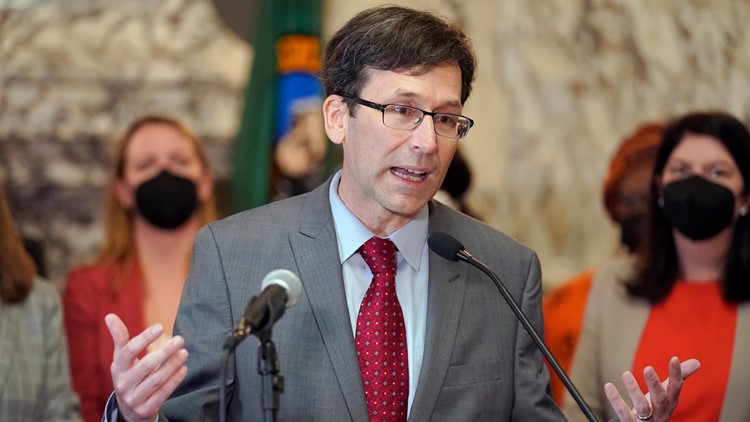SPOKANE, Wash. — Washington State Attorney General Bob Ferguson is weighing on the federal lawsuit that was filed against the City of Spokane and Spokane County over the homeless camp along I-90, commonly known as Camp Hope.
Jewels Helping Hands, several residents of the encampment and Disability Rights Washington filed the lawsuit in October. On Wednesday, the petitioners filed for an emergency temporary restraining order against the defendants. The request seeks to "prevent irreparable harm to plaintiffs and the exceptionally vulnerable residents of Camp Hope."
On Friday, Ferguson filed a statement of interest in the case to provide the Court with information “which WSDOT believes is germane to the Court’s consideration of the Plaintiffs’ request for a Temporary Restraining Order (TRO), and to respond to certain statements made within the briefing pending before the Court.”
In the statement, Ferguson provides the court with information about how the camp was started, shelter space in Spokane, and the legal action the city and county are taking against the Washington State Department of Transportation (WSDOT), which owns the land where the camp is located. He also touched on the state’s plans on getting campers off state property and into stable housing.
“Simply put, the Legislature has pivoted away from—when reasonably practicable—forceful sweeps in favor of holistic, longer-term solutions and services when addressing encampments on State-owned rights of way,” Ferguson said. “Although slower than the local jurisdictions’ preferred option of immediately closing/’sweeping’ the site, WSDOT and Commerce’s plan is consistent with this approach. In contrast, the undefined ‘plan’ at issue, in this case, to immediately remove people and property frustrates the Legislature’s goals and would likely result in scattering the unhoused into the streets and neighborhoods of Spokane.”
Ferguson said WSDOT’s decision not to take legal action to close the site “should not be constructed as, and is not, permission by WSDOT for the individuals living at and the property located at the site to remain, let alone indefinitely.”
Regarding the motion for the emergency temporary restraining order, Ferguson notified the court about law enforcement going to the camp unannounced and distributing flyers telling people the camp is closing.
“The law enforcement officers provided no specific date of closure, which was purportedly an intentional decision,” Ferguson wrote. “The visits were immediately decried as intimidation and a show of force by those at the site, and interrupted the efforts of service providers retained by the State to progress its transitional housing policy decisions (including those from The Catalyst Project finalizing paperwork for individuals scheduled to move there).”
In the motion for the restraining order, the plaintiffs ask for two forms of relief:
- Maintaining the status quo by temporarily restraining the City and County from disbanding Camp Hope at its present location
- Temporarily restraining Defendants from, absent a search warrant, conducting helicopter overflights and/or using infrared imaging or similar technology to surveil or record those located on Camp Hope
Ferguson writes WSDOT does not take issue with the second request for relief.
“WSDOT does not object to the general maintenance of the status quo pending the Court’s resolution of the motion for preliminary injunction scheduled for early January,” Ferguson wrote. “However, WSDOT respectfully requests the Court’s order explicitly provide that any Camp Hope individual on site may nonetheless be removed from WSDOT property for any violation of law or any provision of an agreement setting behavioral requirements. In short, WSDOT requests that any order issued by this Court be narrowly tailored and not hinder the work of WSDOT and its partner agencies (including local law enforcement as necessary)—in accordance with and as contemplated by Washington law—in implementing its mitigation plan to address encampments on State-owned rights of way.”
On Thursday evening, people who live at the camp gathered at Spokane City Hall to protest the presence of law enforcement on WSDOT property.
Spokane City Council President Breean Beggs also called for an executive, closed-door session with the city's legal team on Thursday. Beggs believes removing people without the state's permission could result in lawsuits against the county, city and even individual officers.
Another argument is that despite the Catalyst building opening this week and additional capacity being added to the Trent shelter, there still won't be enough shelter space for everyone at the camp.
DOWNLOAD THE KREM SMARTPHONE APP
HOW TO ADD THE KREM+ APP TO YOUR STREAMING DEVICE
ROKU: add the channel from the ROKU store or by searching for KREM in the Channel Store.
Fire TV: search for "KREM" to find the free app to add to your account. Another option for Fire TV is to have the app delivered directly to your Fire TV through Amazon.
To report a typo or grammatical error, please email webspokane@krem.com.



